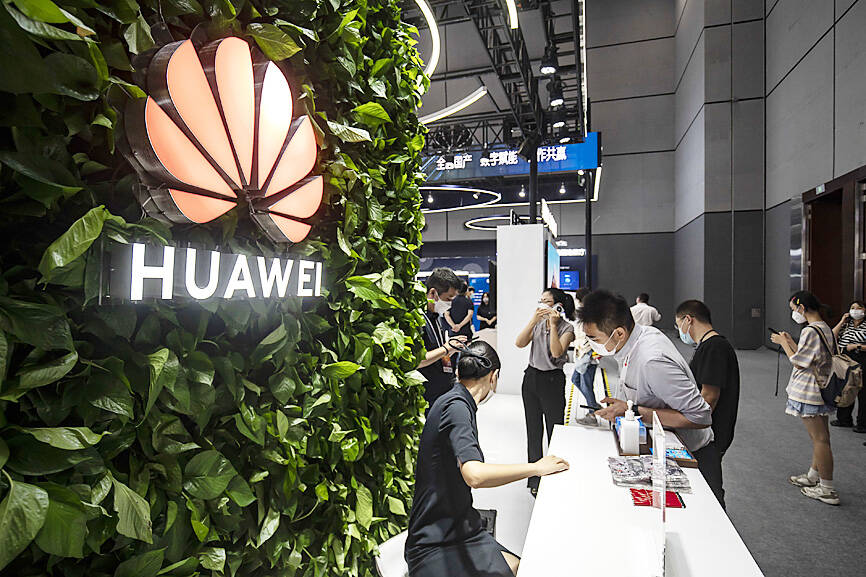Huawei Technologies Co (華為) posted its third straight quarter of growth, declaring a return to normalcy after overcoming a plethora of US restrictions this year.
Huawei’s sales rose 7.2 percent to 191 billion yuan (US$27.47 billion) in the quarter ending this month, after carving out new income streams from areas such as smart vehicles and cloud services, company data showed.
Last year’s sales stood at 636.9 billion yuan, the Shenzhen-based company said, up marginally from a year earlier.

Photo: Bloomberg
Huawei is trying to open up new markets and businesses after US tech export restrictions gutted its smartphone business — briefly the world’s largest — and curtailed the sale of advanced gear in developed markets. Among those trade restrictions is a ban on contract chipmakers producing semiconductors designed by Huawei, crippling its HiSilicon design business.
Huawei rotating chairman Eric Xu (徐直軍) in a new year’s message to employees warned of macroeconomic uncertainty next year.
However, Xu said longer-term demand for technology remains intact. He did not specify how the company might overcome export restrictions, but Huawei has spent much of the past three years developing, researching and sourcing alternatives to US components.
“In 2022, we successfully pulled ourselves out of crisis mode. US restrictions are now our new normal, and we’re back to business as usual,” Xu said.
“The macro environment may be rife with uncertainty, but what we can be certain about is that digitalization and decarbonization are the way forward, and they’re where future opportunities lie,” he added.
Huawei has also sought out alternative sources of income by selling patents, technology services and wireless gear to new customers ranging from automakers to coal mines and industrial parks. It levies royalties from the world’s largest smartphone brands, including Apple Inc and Samsung Electronics Co.
The company has signed more than 20 patent license agreements this year, Huawei global head of IP Alan Fan (樊志勇) said.
“We’ve managed to keep our heads above the water because we fought together,” Xu wrote. “2023 will be the first year that we return to business as usual with external restrictions still in place.”

TECH CLUSTER: The US company’s new office is in the Shalun Smart Green Energy Science City, a new AI industry base and cybersecurity hub in southern Taiwan US chip designer Advanced Micro Devices Inc (AMD) yesterday launched an office in Tainan’s Gueiren District (歸仁), marking a significant milestone in the development of southern Taiwan’s artificial intelligence (AI) industry, the Tainan City Government said in a statement. AMD Taiwan general manager Vincent Chern (陳民皓) presided over the opening ceremony for the company’s new office at the Shalun Smart Green Energy Science City (沙崙智慧綠能科學城), a new AI industry base and cybersecurity hub in southern Taiwan. Facilities in the new office include an information processing center, and a research and development (R&D) center, the Tainan Economic Development Bureau said. The Ministry

ADVERSARIES: The new list includes 11 entities in China and one in Taiwan, which is a local branch of Chinese cloud computing firm Inspur Group The US added dozens of entities to a trade blacklist on Tuesday, the US Department of Commerce said, in part to disrupt Beijing’s artificial intelligence (AI) and advanced computing capabilities. The action affects 80 entities from countries including China, the United Arab Emirates and Iran, with the commerce department citing their “activities contrary to US national security and foreign policy.” Those added to the “entity list” are restricted from obtaining US items and technologies without government authorization. “We will not allow adversaries to exploit American technology to bolster their own militaries and threaten American lives,” US Secretary of Commerce Howard Lutnick said. The entities

Minister of Finance Chuang Tsui-yun (莊翠雲) yesterday told lawmakers that she “would not speculate,” but a “response plan” has been prepared in case Taiwan is targeted by US President Donald Trump’s reciprocal tariffs, which are to be announced on Wednesday next week. The Trump administration, including US Secretary of the Treasury Scott Bessent, has said that much of the proposed reciprocal tariffs would focus on the 15 countries that have the highest trade surpluses with the US. Bessent has referred to those countries as the “dirty 15,” but has not named them. Last year, Taiwan’s US$73.9 billion trade surplus with the US

The Taipei International Cycle Show (Taipei Cycle) yesterday opened at the Taipei Nangang Exhibition Center, with the event’s organizer expecting a steady recovery in the industry this year following a tough last year. This year, 980 companies from 35 countries are participating in the annual bicycle trade show, showcasing technological breakthroughs and market development trends of the bicycle industry at 3,600 booths, the Taiwan External Trade Development Council (TAITRA, 外貿協會) said in a statement. Under the theme “Ride the Revolution,” the exhibition has attracted more than 3,500 international buyers from 80 countries to preregister for the four-day event, which is expected to